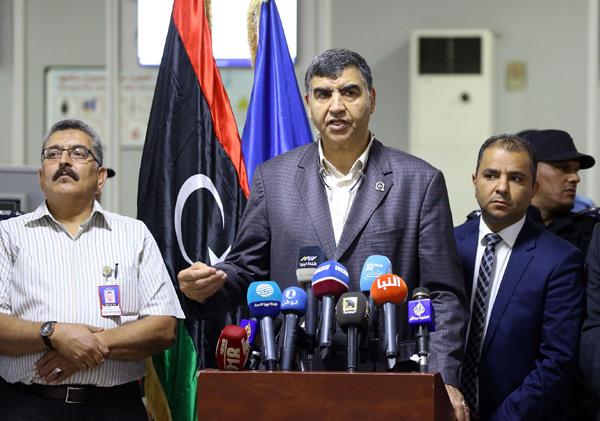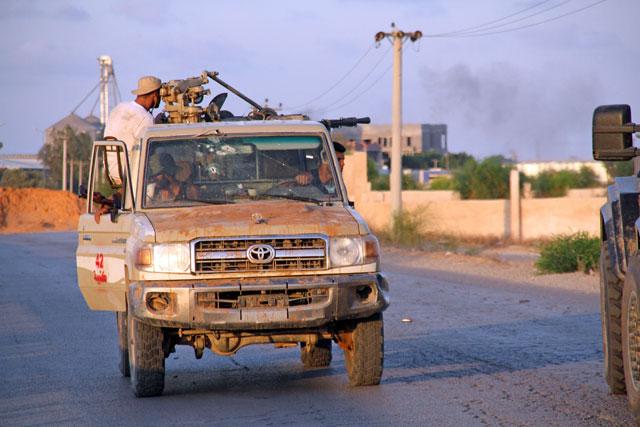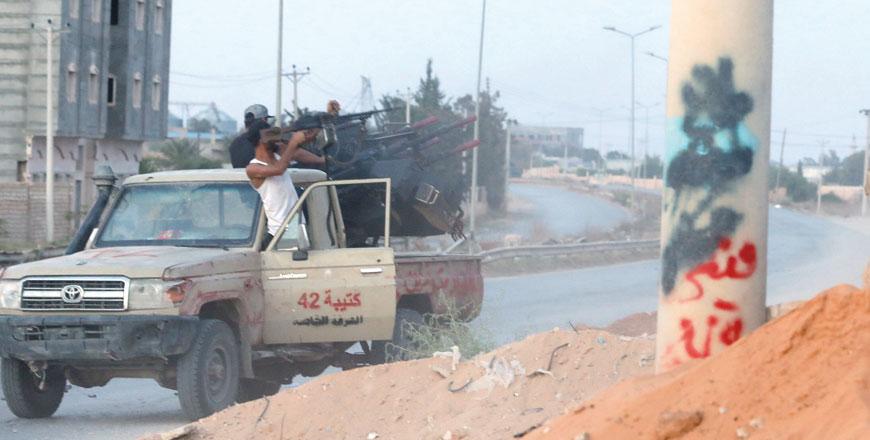You are here
Libya rivals clash south of capital, causing blackouts
By AFP - Sep 18,2018 - Last updated at Sep 18,2018

Libyan Interior Minister Abdessalam Achour (centre) and undersecretary of the Ministry of Communications in the Al Wefaq Government Hisham Abu Shkiwat (right) give a press conference in which they unvailed new security dispositions for Tripoli's Mitiga International Airport on Monday (AFP photo)
TRIPOLI — New clashes flared between rival militias south of Libya's capital Tripoli on Tuesday, causing widespread power outages, the national electricity firm said.
The fighting underscored the fragility of a United Nations-backed ceasefire reached earlier this month after days of deadly violence between armed groups in the capital, beset by turmoil since the fall of dictator Muammar Qadhafi in 2011.
Tuesday morning's clashes centred on the main road to Tripoli's long-closed international airport, according to witnesses including an AFP journalist.
Libya's National Electricity Company said its network had been damaged, causing a total blackout across the North African nation's south and west.
Fighting which broke out late last month killed at least 63 people and wounded 159 others — mostly civilians — before the ceasefire came into effect on September 4.
Last week, the capital's only working airport came under rocket fire just days after reopening following the truce.
Mitiga International Airport, located in a former military base that includes a prison, is currently controlled by the Special Deterrence Forces, a Salafist militia which serves as Tripoli's police force and has been involved in clashes around the capital.
Interior Minister Abdessalam Ashour said Monday that a "regular force" would be tasked with securing the airport.
UN envoy Ghassan Salame later reported 14 ceasefire violations around Tripoli, but sought to play them down, saying the deal had been "generally respected".
Tripoli's main airport has been out of action since it was severely damaged by similar clashes in 2014.
Since Qadhafi's fall in 2011, oil-rich Libya has been rocked by violence between dozens of armed groups vying for control of its cities and vast oil resources.
A UN-brokered agreement signed in Morocco in December 2015 established the Government of National Accord (GNA) in a bid to ease the chaos.
But deep divisions remain between the GNA and rivals including military strongman Khalifa Haftar, who is based in eastern Libya and backs a competing authority.
The GNA last week announced a series of measures to secure the capital and curb the influence of militias over state institutions and banks.
Related Articles
TRIPOLI — At least 115 people have been killed and 383 injured in month-long clashes between rival factions in Tripoli, Libya's health minis
TRIPOLI — Libya's internationally recognised government has called on the UN to take "concrete and effective" action to protect civilians an
TRIPOLI — The head of Libya's UN-backed government on Sunday reshuffled key cabinet posts, replacing the interior minister amid efforts to b













